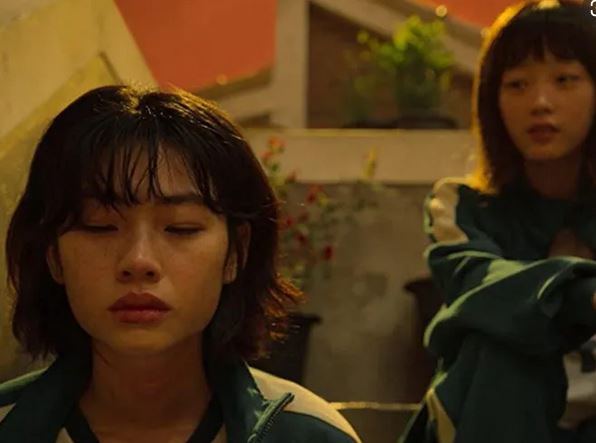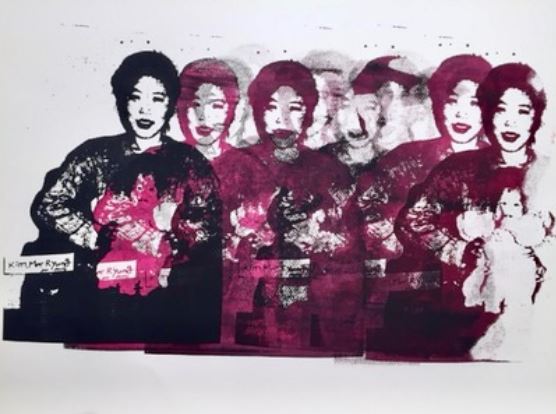By Shannon Donaghy
Let’s start off by saying I’m an adoptee from South Korea who doesn’t know who her “real parents” are. South Korea is home of Netflix’s most successful series of all time, Squid Game. In the show, desperate players who are in debt and are considered part of the lower ranks of society all compete for a 40 billion Won prize (40 million USD). Little do they know going into the games, death awaits without hesitation or mercy.
My birthmother, a single unmarried woman in Korea, would be considered on the same societal level as one of these competitors if she became desperate enough (though I know nothing about her current life to be sure of this today). Being a single unwed mother in Korea is considered taboo in Korean society. She is high-school educated, yet did not attend college unlike Sangwoo’s character, who is highly revered due to attending a prestigious Korean university. This implies he not only has privilege in his intelligence but also possibly some financial privilege.
Kim Jooryung plays Han Minyeo, a “mysterious woman” (many articles call her that). Like my birth mother, she is an enigma. I have no photos of her, only her name, where she was from, and some fragmentary background information. Minyeo supposedly has an unnamed baby at home and announces this to the guards of the Game once the players discover the bleakness of the situation (however, this may be a lie, as she admits later she has swindled people all around Korea). That reminded me of how it wasn’t my Eomma (mother) who gave me my Korean name, but the intake worker.
Watching the show, I pictured her in the Games, competing in order to keep me. In reality, according to my adoption files, she could not take care of me because of her developing schizophrenia after having a “brief encounter with a male” in 1988, and then “kept in short company” of another man in 1992 and then had me. She was then unable to support me financially since my birthfather was never part of the picture. I wish they would have told me exactly what happened, whether it was her choice to be in those relationships or not. I wonder if the man from 88′ triggered her disorder by doing something violent.
Most people, including myself, have referred to this character as “that crazy lady from Squid Game.” Women have an unfortunate history of being called crazy or hysterical when in reality they were suffering from various mental health issues and disorders. Some examples of hysterical women in media include the main character in Charlotte Perkins Gilamn’s short story The Yellow Wallpaper, who begins to see a woman within the walls of her bedroom. Other examples include Lisa from the novel turned film Girl, Interrupted, a character diagnosed with sociopathy who is confined to a facility, and even Azula from Nickelodeon’s Avatar the Last Airbender, wherein the comics, she ends up in a mental asylum due to hallucinations and manic behavior.
Most of these tropes consider these types of women to be violent and a menace to society. Although Mineyo is there to drive the plot as well, she still ends up with the reputation of being an unstable and dangerous woman, all due to her showing more outspoken and extroverted, risk-taking behavior in comparison to the other more demure women in the Games.
Throughout the show, it’s clear that Minyeo will do anything, including using her body, to get what she wants for survival. Her character is overly emotional, loud, and full of expression. She is impulsive and abnormal, brash and crass, and even makes a racist remark to Ali, a Game player from Pakistan who is trying to support his family (this is not surprising though since Korea is very homogenous compared to the US, but does not mean it is right!)
I can easily see her listening to Lana Del Rey’s music, wanting to get “high by the beach” or songs about sleeping your way to the top, partying like it’s your last time. She even gives her “Oppa,” Deoksu (as she comically addresses him), the middle finger upon being rejected from a former game. Very opposite of what is expected from a “proper” Korean woman, and it’s extremely refreshing to see that as a Korean American woman.
I never knew I could see my birth mother as a “bad girl” so to speak, being extremely bold and self-confident in front of even the most intimidating men. I’ve always pictured her meek and quiet, powerless and sad with her situation. It was like a revelation. If she can channel such confidence, maybe I can, too. Mineyo chooses her own fate and gets her murder-suicide revenge at the end, and for a woman with nothing much to begin with, that’s certainly something.
Did she use her impulsiveness as a survival mechanism? Or did her need for survival cause her to make impulsive decisions? Like with both Mineyo and my birth mother, we will never know.
I don’t want to think of my birthmother as some manic, dismal woman cast out by society, yet as a woman who has been put into rough situations where she alone had to handle them and figure out what was best for her life. A woman who hopefully grew stronger with time, who made the toughest men fear her 5’4″ self.
I’ve held so much remorse and negativity over my birth mother for so long, I neglected to see the other facets of who she could be as a person. Maybe she wasn’t as extreme in her ways as the Netflix character, but she was still a person who loved, cursed, wanted to feel attractive and loved, struggled, and had to use whatever resources she had to get by. Maybe she was funny too. It’s funny how these traits that are seen as “negative” in Korea, seem all the more charming to me.
Maybe this is just a sad, desperate attempt for me to connect with someone that’s part of me but I know I probably will not meet, but like the players in the Game, it’s all I have, and you F*CKING BET that I’m going to bask in it as much as possible.
AsAmNews has Asian America in its heart. We’re an all-volunteer effort of dedicated staff and interns. Check out our new Instagram account. Go to our Twitter feed and Facebook page for more content. Please consider interning, joining our staff, or submitting a story, or making a contribution.


